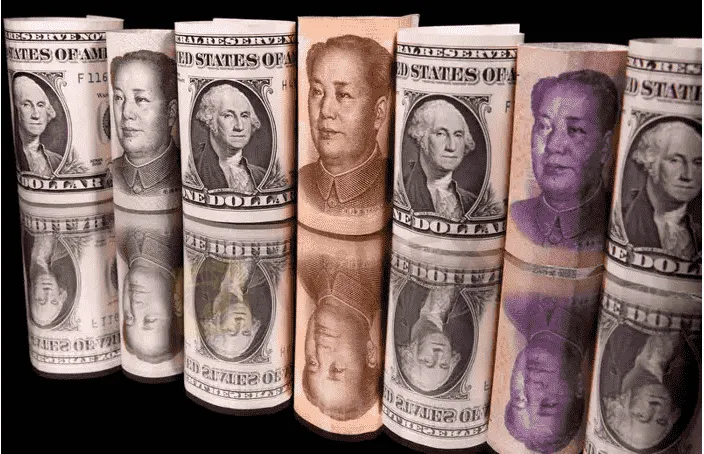简体中文
繁體中文
English
Pусский
日本語
ภาษาไทย
Tiếng Việt
Bahasa Indonesia
Español
हिन्दी
Filippiiniläinen
Français
Deutsch
Português
Türkçe
한국어
العربية
Euro bounces back above parity as investor sentiment improves
Abstract:The euro rebounded back above parity with the dollar on Thursday as the U.S. currency’s recent rally ran out of steam and investors waited to see whether Federal Reserve Chair Jerome Powell would sound a more hawkish tone at a meeting this week.

Investors have also been bracing for the Fed to double down on its commitment to crushing inflation at its annual gathering in Jackson Hole, Wyoming, where Powell is due to speak.
The euro/dollar‘s direction this week has largely been driven by soaring natural gas prices, which are correlated with a weaker euro because of the region’s dependence on gas for its energy needs. Worries about the global economy had sent investors into dollars earlier this week.
“The main driver of U.S. dollar weakness overnight has been a temporary easing of global growth concerns,” said Lee Hardman, an analyst at MUFG, citing media reports that Chinese authorities are stepping up economic support measures with more planned funding for infrastructure.
By 0810 GMT, the U.S. dollar index, which measures the greenback against six counterparts, eased 0.4% to 108.17, but remained not far from its highest since September 2002 at 109.29, touched in mid-July.
The euro was 0.4% higher at $1.001 after this week hitting a 20-year low below parity.
The Australian dollar rose 1.1% to $0.6983, while the Japanese yen rallied 0.4% and sterling by half a percent.
The stronger Aussie dollar came as Chinas yuan rebounded from a two-year low, helped by firmer-than-expected official guidance, which traders took as a sign that authorities are becoming increasingly uncomfortable with rapid losses in the currency. [CNY/]
“In terms of the sharp AUD bounce today, an obvious catalyst appears to be the bounce in CNH on the stronger than expected fixing,” said Sean Callow, a strategist at Westpac in Sydney.
“The positive equity mood in much of the region does help the Aussie in the background.”
Key data releases on Thurday in Europe include the German IFO numbers on the business climate and the release of the minutes of the European Central Banks July meeting, when it hiked interest rates by 50 basis points.

Disclaimer:
The views in this article only represent the author's personal views, and do not constitute investment advice on this platform. This platform does not guarantee the accuracy, completeness and timeliness of the information in the article, and will not be liable for any loss caused by the use of or reliance on the information in the article.
Read more

Breaking News! Federal Reserve Slows Down Interest Rate Cuts
The latest Federal Reserve meeting minutes show that Fed officials are generally concerned about the upward risks to inflation, suggesting that future rate cuts may slow down.

Big News! UK 30-Year Bond Yields Soar to 25-Year High!
Following the successful auction of 30-year government bonds by the UK, the yield on 30-year bonds surged, reaching its highest level in 25 years. This increase reflects growing concerns in the market over the government's fiscal policies and large-scale debt issuance.

Beware of Fraudulent Letters: Malaysia’s Securities Commission Issues Warning
The Securities Commission Malaysia (SC) has raised an alarm over fraudulent letters and emails falsely claiming to be from the regulatory body. These fake communications are allegedly tied to illicit investment schemes that seek payments from unsuspecting investors.

Singapore’s New Law Allows Police to Freeze Scam Victims’ Bank Accounts
Singapore has enacted a new law enabling police to freeze bank accounts of scam victims as a last-resort measure to prevent financial losses.
WikiFX Broker
Latest News
Pepperstone Sponsored the "Aston Martin Aramco Formula One Team"
ACY Securities Integrates MetaTrader 5 to Enhnace Copy Trading Service
Soegee Futures Review: Should You Trust This Broker?
Malaysian Pilot Loses RM1.36 Million in UVKXE Investment App Scam
Indonesia officially joins the BRICS countries
Attention! Goldman Sachs Cuts Gold Target to $2910
Inflation Rebounds: ECB's Big Rate Cut Now Unlikely
Carney \considering\ entering race to replace Canada\s Trudeau
High-Potential Investments: Top 10 Stocks to Watch in 2025
Why Is Nvidia Making Headlines Everywhere Today?
Currency Calculator






